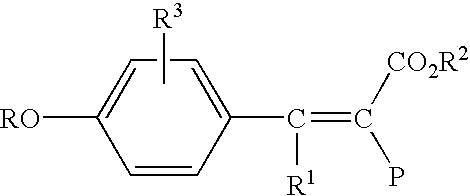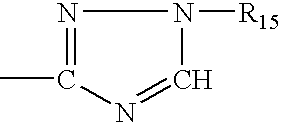High IV melt phase polyester polymer catalyzed with antimony containing compounds
a polyester polymer and high iv melt phase technology, applied in the manufacture of polyester polymers, can solve the problems of increasing the cost of polymer composition making and reducing the brightness of the polymer
- Summary
- Abstract
- Description
- Claims
- Application Information
AI Technical Summary
Benefits of technology
Problems solved by technology
Method used
Image
Examples
examples
[0123] The following apply to all the examples and comparative examples. The starting oligomeric mixture employed in the polycondensations throughout all the examples, unless otherwise noted, was prepared from terephthalic acid, ethylene glycol, about 1.5 mole percent of about 35% cis / 65% trans 1,4-cyclohexanedimethanol, and about 1.2-1.3 weight percent of diethylene glycol generated during esterification. The conversion of acid groups was about 95% by NMR / titration carboxyl ends groups. The Mn of the oligomeric mixture was about 766 g / mole, and the Mw was about 1478 g / mole. All of the high IV polyesters in the examples were made exclusively in the melt phase, i.e., the molecular weight of the polyester polymer melt phase products as indicated by their Ih.V. were not increased in the solid state.
[0124] In the titanium catalyzed samples, the following test procedure was used. For polycondensation, the ground oligomer (103 g) is weighed into a half-liter, single-necked, round-bottome...
example 2
[0137] In this series of examples, phosphorus stabilizers were added during the melt-phase synthesis. The type of stabilizer added in all cases was an oligomeric phosphate triester. The amount is varied as shown in Table 2. The lowest phosphorus:metal mole ratio (P:M Z) is zero.
[0138] Reheat additives, reducing agents, and toners are not added to the melt in these samples. Each of samples illustrate the P:M Z effect, catalyst level, and temperature on the b* and the L* of high It.V. polyester polymer melt phase products.
[0139] A designed experiment varies antimony level (Sb), reaction temperature and / or the phosphorous / Sb molar ratio. The oligomer charge, equipment and antimony catalyst solution are the same as described in Example 1. The vacuum level in the finisher reaction zone is fixed at 0.8 torr in all experiments using Sb compounds as the catalyst. The phosphorus solution is added at stage 5, before initiating polycondensation in stage 7 and after completing the esterificat...
example 3
[0142] This example evaluates the level of colorant that needs to be added to a titanium and an antimony catalyzed fully formulated polyester polymer composition to obtain similar b* color levels; the effect on L* color by the addition of the colorant toners, and the reaction time to reach similar It.V. levels.
[0143] In this example, phosphorus thermal stabilizers are added to polyester polymers catalyzed with low levels of titanium (5 ppm) at relatively low temperatures (270° C.). When terminating a polymer run at a torque equivalent to approximately 0.80 IhV, the reaction time was about 155 min. The P / Ti mole ratio was at least one. After the 155 minutes of polymerization time, the vacuum was broken, the phosphorus compound was added, and vacuum was resumed to enhance mixing.
[0144] In this example, the phosphorus compound is either phosphoric acid or an oligomeric phosphate triester. To avoid a potential loss in It.V., a concentrated form of the phosphorus compound was used. By ...
PUM
| Property | Measurement | Unit |
|---|---|---|
| temperature | aaaaa | aaaaa |
| temperature | aaaaa | aaaaa |
| temperature | aaaaa | aaaaa |
Abstract
Description
Claims
Application Information
 Login to View More
Login to View More - R&D
- Intellectual Property
- Life Sciences
- Materials
- Tech Scout
- Unparalleled Data Quality
- Higher Quality Content
- 60% Fewer Hallucinations
Browse by: Latest US Patents, China's latest patents, Technical Efficacy Thesaurus, Application Domain, Technology Topic, Popular Technical Reports.
© 2025 PatSnap. All rights reserved.Legal|Privacy policy|Modern Slavery Act Transparency Statement|Sitemap|About US| Contact US: help@patsnap.com



